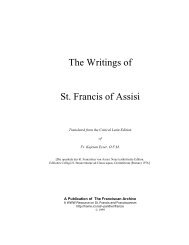the history of heresies, and their refutation - Catholic Apologetics ...
the history of heresies, and their refutation - Catholic Apologetics ...
the history of heresies, and their refutation - Catholic Apologetics ...
You also want an ePaper? Increase the reach of your titles
YUMPU automatically turns print PDFs into web optimized ePapers that Google loves.
Lucian. Authors vary regarding <strong>the</strong> time <strong>and</strong> place <strong>of</strong> Constantino’s baptism. Eusebius says that he was<br />
baptized in Nicomedia, a few hours before his death, but o<strong>the</strong>r writers assert that he was baptized in<br />
Rome by St. Sylvester, thirteen years before, in <strong>the</strong> year 324. Cardinal Baronius holds this opinion, <strong>and</strong><br />
quotes many authorities in favour <strong>of</strong> it, <strong>and</strong> Schelestratus brings forward many Greek <strong>and</strong> Latin<br />
authorities to prove <strong>the</strong> same. The generality <strong>of</strong> authors, however, follow Eusebius, Socrates, Sozymen,<br />
Theodoret, <strong>and</strong> St. Jerome, Fleury, <strong>and</strong> Orsi, <strong>and</strong> especially Noel Alex<strong>and</strong>er, who answers <strong>the</strong> arguments<br />
<strong>of</strong> Baronius, <strong>and</strong> cites for his own opinion St. Ambrose, St. Isidore, Papebrock <strong>and</strong> <strong>the</strong> fa<strong>the</strong>rs <strong>of</strong> St. Maur.<br />
These last say that Constantino, being near his end, in Nicomedia, wished to receive from <strong>the</strong> bishops, in<br />
<strong>the</strong> church <strong>of</strong> St. Lucian, <strong>the</strong> imposition <strong>of</strong> h<strong>and</strong>s a ceremony <strong>the</strong>n in use previous to baptism, <strong>and</strong><br />
practised with every catechumen.<br />
(20) Baroniu, Soc. Sozymen, Libellus, Marcel. & Fausti, p. 19; St. Epiplian. Loc. Cit.<br />
<br />
He was <strong>the</strong>n carried to a castle, called Aquirion, a little distant from Nicomedia, <strong>and</strong>, having summoned<br />
<strong>the</strong> bishops, he received baptism with <strong>the</strong> greatest devotion. " Now," said he, " I feel myself truly happy."<br />
His <strong>of</strong>ficers <strong>the</strong>n came to him, <strong>and</strong>, with tears in <strong>the</strong>ir eyes, expressed <strong>the</strong> wish <strong>the</strong>y had for his<br />
restoration to health <strong>and</strong> long life; but he said, " I have now received <strong>the</strong> true life, <strong>and</strong> I have no o<strong>the</strong>r<br />
wish but to go <strong>and</strong> enjoy God." St. Jerome, in his Chronicle, says that he lapsed into Arian errors, but his<br />
festival is commemorated in <strong>the</strong> Greek Menalogy, according to Noel Alex<strong>and</strong>er, on <strong>the</strong> 21st <strong>of</strong> May, <strong>and</strong><br />
<strong>the</strong> same author wrote a dissertation to prove that he died a good <strong>Catholic</strong>, <strong>and</strong> all <strong>the</strong> ancients, he says,<br />
agree in that opinion with St. Athanasius, St. Hilary, St. Epiphanius, <strong>and</strong> St. Ambrose; <strong>and</strong> we have,<br />
likewise, <strong>the</strong> authority <strong>of</strong> <strong>the</strong> Council <strong>of</strong> Rimini, in <strong>the</strong> synodal epistle written to <strong>the</strong> Emperor<br />
Constantius, <strong>and</strong> quoted by Socrates, Theodoret, Sozymen, <strong>and</strong> St. Athanasius. Cardinal Orsi remarks<br />
that <strong>the</strong> baptism <strong>of</strong> Constantine, by Eusebius, ought not to render his faith suspected, <strong>and</strong> that this is no<br />
pro<strong>of</strong> <strong>of</strong> a leaning to Arianism, as St. Jerome suspects, since we see how strenuously he defended <strong>the</strong><br />
Council <strong>and</strong> doctrine <strong>of</strong> Nice, <strong>and</strong> especially since he recalled St. Athanasius from exile immediately after<br />
his baptism, notwithst<strong>and</strong>ing <strong>the</strong> opposition <strong>of</strong> Eusebius <strong>of</strong> Nicomedia. Sozymen says that <strong>the</strong> Emperor<br />
left this order in his will, <strong>and</strong> that Constantine <strong>the</strong> Younger, when he sent back St. Athanasius to his see,<br />
declared that, in doing so, he was fulfilling <strong>the</strong> will <strong>of</strong> his fa<strong>the</strong>r; <strong>and</strong> St. Athanasius attests that, at <strong>the</strong><br />
same time, all <strong>the</strong> o<strong>the</strong>r <strong>Catholic</strong> bishops were reinstated in <strong>the</strong>ir sees (21).<br />
<br />
29. Constantine died on <strong>the</strong> feast <strong>of</strong> Pentecost, <strong>the</strong> 23rd <strong>of</strong> May, 337, <strong>and</strong> divided <strong>the</strong> empire among his<br />
children <strong>and</strong> nephews. To Constantius <strong>the</strong> Elder he left all that was possessed by his fa<strong>the</strong>r, Constans,<br />
<strong>and</strong> Gaul, Spain, <strong>and</strong> Britain besides; to Constantius <strong>the</strong> Second, Asia, Assyria, <strong>and</strong> Egypt; <strong>and</strong> to<br />
Constantius <strong>the</strong> Youngest, Africa, Italy, <strong>and</strong> Illyria; <strong>and</strong> to his nephews, Dalmatius <strong>and</strong> Hannibalianus,<br />
some provinces <strong>of</strong> less note.<br />
(21) Socrates; Baron, An. 336; Auctores, cit.; Euseb. Vita Constant.; Schelestr. in Antiquit. &c.<br />
<br />
It was <strong>the</strong> will <strong>of</strong> <strong>the</strong> Almighty, however, that Constantino <strong>the</strong> Younger <strong>and</strong> Constans died, so <strong>the</strong> whole<br />
empire fell into <strong>the</strong> sway <strong>of</strong> Constantius, a great misfortune for <strong>the</strong> Church, for he was a violent<br />
persecutor, <strong>and</strong> Constantius <strong>and</strong> Constans were its friends (22).<br />
(22) Auctores, cit. ibid.<br />
<br />
III.THE EMPEROR CONSTANTIUS PERSECUTES THE CATHOLICS. 30.Eusebius <strong>of</strong> Nicomedia is<br />
translated to <strong>the</strong> See <strong>of</strong> Constantinople; Synods in Alex<strong>and</strong>ria <strong>and</strong> Antioch. 31. -Council <strong>of</strong> Sardis. 32-<br />
Council <strong>of</strong> Aries. 33.-Council <strong>of</strong> Milan, <strong>and</strong> Exile <strong>of</strong> Liberius. 34.~Exile <strong>of</strong> Osius. 35.-Fall <strong>of</strong> Osius. 36. -<br />
Pall <strong>of</strong> Liberius. 37. - First Formula <strong>of</strong> Sirmium. 38. -Second Formula <strong>of</strong> Sirmium. 39. -Third Formula <strong>of</strong><br />
Sirmium. 40. -Liberius signs <strong>the</strong> Formula, &c. 41, 42. -He signs <strong>the</strong> first Formula. 43.-Return <strong>of</strong> Liberius<br />
to Rome, <strong>and</strong> Death <strong>of</strong> Felix. 44. -Division among <strong>the</strong> Arians. 45-48,-Counoil <strong>of</strong> Rimini. 49.-Death <strong>of</strong><br />
Constantius. 50. -The Empire descends to Julian. The Schism <strong>of</strong> Lucifer.<br />
<br />
30. St. Alex<strong>and</strong>er, Patriarch <strong>of</strong> Constantinople, died about <strong>the</strong> year 340, at <strong>the</strong> age <strong>of</strong> ninety-eight, <strong>and</strong><br />
Paul <strong>of</strong> Thessalonica was chosen his successor; but Constantius, who now publicly pr<strong>of</strong>essed himself an<br />
Arian, being absent during <strong>the</strong> election, was highly indignant on his return to Constantinople, <strong>and</strong>,<br />
pretending that Paul was unworthy <strong>of</strong> <strong>the</strong> bishopric, joined with <strong>the</strong> Arian party, <strong>and</strong> had a council<br />
convoked, in which he procured <strong>the</strong> deposition <strong>of</strong> Paul <strong>and</strong> <strong>the</strong> appointment <strong>of</strong> Eusebius <strong>of</strong> Nicomedia,<br />
now, for <strong>the</strong> second time, translated to a new see, in opposition to <strong>the</strong> laws <strong>of</strong> <strong>the</strong> Church. About <strong>the</strong> same<br />
time ano<strong>the</strong>r council was assembled in Alex<strong>and</strong>ria, consisting <strong>of</strong> about a hundred bishops from Egypt,<br />
Page 32 <strong>of</strong> 352













